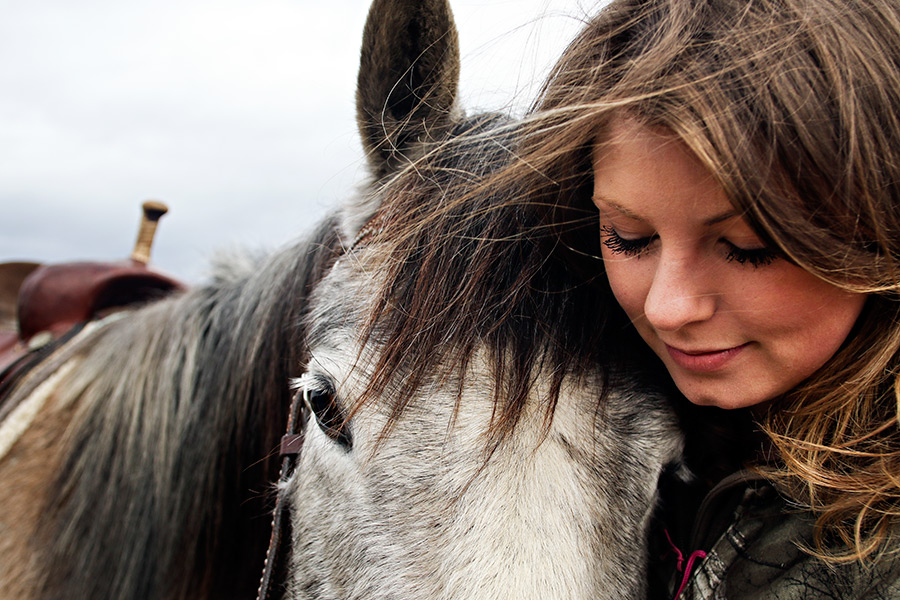In 2012, Louise Shye sat in the veterinarian’s office at Washington State University and wept as the vet explained her options. Shye had just learned that her yearling Lea, the first horse that she’d ever called her own, was completely and irreversibly blind. As the veterinarian told it, Shye could either euthanize Lea, sell her, or keep her as a pasture horse — breaking Lea to ride would likely be out of the question. But in Shye’s mind, there was only ever one course of action.
“She set the goal, challenged herself right then and there, to keep her and ride her,” said Roy Chance, one of Shye’s closest mentors and the owner of RC Bar Ranch in Ellensburg, Washington, where Shye rode horses while earning a degree in photography from Central Washington University. Chance remembers Shye telling him that she knew Lea could “do anything any other horse can do.”
A lifelong horse-lover, Shye was determined to train the horse she’d waited since middle school to own.
“She loves animals of all kinds,” Chance said of Shye, who also trains dogs and owns two of her own, one of which is blind. “That’s a lot of why she’s had so much success because she is such an animal lover and a natural horseman.”
Lea often bumps into things, but she moves slowly and carefully, stopping to smell and inspect anything she runs into. Eager to please and a quick learner, she’s always been able to move about independently, if not perfectly, and she could find her own food and water even as a foal. Most importantly, Lea quickly learned to trust Shye, with whom she formed a fast bond, as her eyes.
Now, four years after the official diagnosis — optic nerve atrophy and retinal degeneration— and three years after moving to Kalispell from Washington, Shye and Lea are practicing weekly to compete in barrel racing at this year’s Summer Rodeo Series.
“She was so willing to learn, why not try [to teach her]?” Shye, who has always loved barrel racing, asked. “Humans can navigate with their disabilities, why not horses? We didn’t let the disability get in the way and we didn’t baby her.”
Shye, who’d never before trained a horse on her own, says that she didn’t use any particular method to train Lea, and is learning alongside her horse. Luckily, Lea rarely spooks and is extremely attentive, which Shye attributes to her blindness and says makes her easy to work with.
“Her ears are always going 100 mph because she’s always listening to everything,” Shye said. With barrel training, Shye continued, “it’s all on my cue, which is very verbal. I feel like I’m the loudest person out there.”
After a few months of training, Lea now recognizes the barrel patterns, “but the barrels aren’t always the same distance apart,” Shye said, so “if she knocks a barrel over, it’s my fault, I can’t blame her.”
Shye says they’re competing this summer not to win prizes, but to get Lea out and into the world. A professional photographer and a new member of the Northwest Montana Backcountry Horsemen, Shye also hopes to start a blog chronicling Lea’s inspiring journey with the rugged Montana wilderness as a backdrop.
“I want to take pictures of her in places you wouldn’t see a blind horse, like the Bob Marshall Wilderness or Glacier,” Shye said. “You wouldn’t think she’s a blind horse.”
And you’d hardly think Shye is the owner of one. In addition to barrel training, Shye pushes Lea to do anything a horse with perfect vision could accomplish. Though trail riding was once Shye’s “biggest worry,” she’s been taking Lea on increasingly difficult trips, which she believes has built Lea’s confidence. Last July, the pair tackled the windy, cliffy trail to Lupine Lake in the Flathead National Forest.
“I was out of my comfort zone,” Shye said. “She doesn’t know where she’s going, so if we go off a cliff, that’s my fault… As a rider, I can’t be lazy and taking pictures or on my phone.”
Instead, she has to be peering forward, on constant alert just in case she needs to let Lea know about any upcoming obstacles. As they came up on a huge log, 3-4 feet tall, on the way to Lupine Lake, Shye braced herself. But Lea hopped right over, and made it to the lake unscathed, a milestone accomplishment and a testament to Shye’s efforts.
“Louise didn’t give up, like everyone told her she should,” said Chanel Olson, who helps her father, Brian, operate the Lost Creek Ranch in Kalispell, where Shye boards Lea. “I was a little skeptical. I’d had a half blind horse, who was a nut. [Shye and Lea] just have a real good bond.”
Shye chalks her and Lea’s success up to their connection, too—“this is all trust and a bond and love,” she said.
